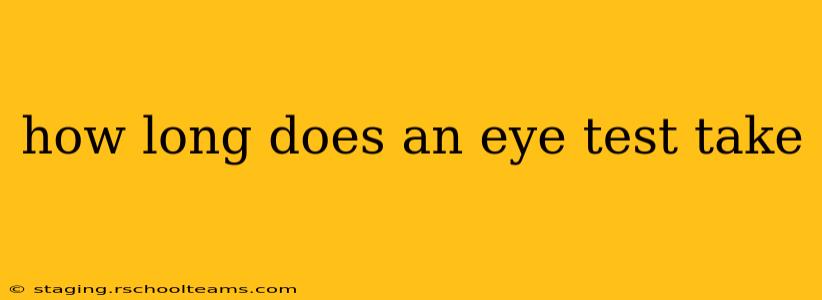A comprehensive eye exam can take anywhere from 30 minutes to an hour, sometimes even longer depending on several factors. While a quick vision screening might only take a few minutes, a thorough examination designed to detect eye diseases and assess overall eye health requires a more significant time commitment. This article will delve into the specifics, exploring the various components of an eye exam and how long each stage typically takes.
What Happens During a Comprehensive Eye Exam?
A typical comprehensive eye exam involves several key steps:
-
Patient History and Discussion (5-10 minutes): Your optometrist or ophthalmologist will begin by reviewing your medical history, discussing any family history of eye conditions, and asking about your current vision concerns, symptoms, and lifestyle habits (e.g., computer use, contact lens wear). This initial conversation helps them tailor the exam to your specific needs.
-
Visual Acuity Test (5-10 minutes): This is the classic eye chart test, measuring your distance vision. You'll read letters or symbols at increasing distances to determine your visual acuity. This portion also includes near vision testing, typically using a smaller chart held at a reading distance.
-
Refraction (10-15 minutes): This crucial part of the exam determines your refractive error – whether you are nearsighted, farsighted, or have astigmatism. Your optometrist uses different lenses to find the best prescription to correct your vision. This often involves an automated phoropter, but might also include subjective refinement techniques.
-
Eye Muscle Function Testing (5-10 minutes): This tests how well your eye muscles work together. You might follow a moving light or object with your eyes, or be asked to focus on a target at various distances. This helps detect conditions like strabismus (crossed eyes).
-
Pupil Response and Examination of Eye Structures (5-10 minutes): Your doctor will examine the front of your eye (cornea, iris, pupil) using various instruments, such as a slit lamp, and assess the pupils’ response to light. This helps detect early signs of glaucoma, cataracts, and other diseases.
-
Intraocular Pressure Measurement (5 minutes): This measures the pressure inside your eye, a crucial indicator of glaucoma risk. This is typically done using a non-contact tonometer or an air-puff tonometer. In some cases, a more detailed test might be required.
-
Retinal Examination (5-10 minutes): Using an ophthalmoscope or retinal camera, your doctor will examine the back of your eye (retina, optic nerve, blood vessels). This detects potential problems like macular degeneration, diabetic retinopathy, or other retinal diseases.
How Long Does a Routine Eye Exam Take?
Adding up the time estimates above, a routine comprehensive eye exam generally takes between 30 to 60 minutes. However, this is just an estimate. If additional tests are needed or if your doctor discovers something that requires further investigation, the appointment could extend beyond this timeframe.
What Factors Can Affect the Length of an Eye Exam?
Several factors can influence the duration of your eye exam:
- The complexity of your case: If you have pre-existing eye conditions or symptoms, the examination will likely take longer.
- The need for additional tests: If your initial screening reveals a need for further investigation, such as retinal imaging or visual field testing, the appointment will be extended.
- Your doctor's schedule: While aiming for efficiency, your doctor's overall schedule might also affect the time allocated to your appointment.
What if My Eye Exam Takes Longer Than Expected?
If your eye exam takes longer than anticipated, it’s usually because the doctor needs more time to assess your eyes thoroughly. This is often a positive sign, as it indicates that they are taking the time necessary to ensure your eye health is properly evaluated.
Are There Shorter Eye Exams?
Yes, shorter vision screenings are available. These primarily focus on assessing visual acuity and might not include a full examination of the internal eye structures or tests for eye diseases. These are often found in vision centers or primary care settings and take only a few minutes. However, these should not replace a comprehensive eye exam from an ophthalmologist or optometrist.
In summary, while a quick vision screening might be done swiftly, a thorough and comprehensive eye examination aimed at detecting and managing eye diseases and ensuring overall eye health will typically take between 30 and 60 minutes. Remember, the time investment is well worth it for protecting your precious eyesight.
